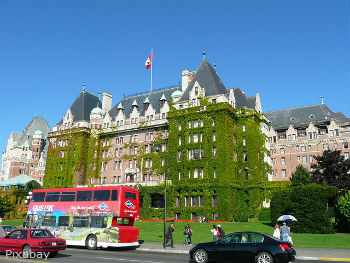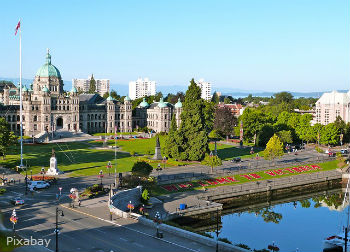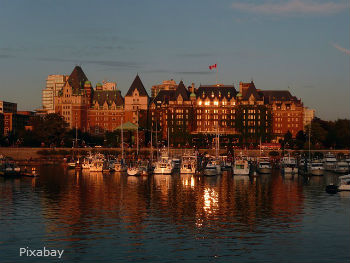The incredibly mild and famously easy-going city of Victoria offers new and old residents a permanent vacation-like lifestyle. British  Columbia’s capital gets its pleasant weather from being nestled behind the Olympic Mountains and on the southern tip of Vancouver Island. “The Garden City” is known for its many retirees, but also has a healthy population of post-secondary students and vibrant activities.
If you want to move to this city where it rarely rains or gets below freezing, this guide is for you.
Victoria Climate
Victoria’s idyllic climate is one of the main reasons why it is such a desirable place to live. Like nearby Vancouver, the city has mild summers and winters. Only about ten nights each year drop below zero degrees Celsius due to the city’s Oceanic climate, and sometimes there is no freezing for an entire year. Winter lows average 4 degrees Celsius-- cool, but not cold enough for snow.
The Pacific Ocean also cools Victoria’s summers, so temperatures are typically under 30 degrees Celsius. The average summer high is only 20 degrees.
The adjacent Olympic Mountains’ rain shadow effect makes Victoria uniquely dry. Unlike other cities on the Pacific coast, Victoria is mostly sunny and has distinct dry seasons. Vancouver (“Rain City”) is just 100 kilometres away, but Victoria gets only one third of the rain that its wet neighbour gets. When there is precipitation in Victoria, it usually is during the four-month “wet” season that spans the winter.
Victoria Neighbourhoods
Victoria has 13 official neighbourhoods and a handful of important unofficial areas, like Chinatown. Downtown Victoria is the busiest neighbourhood since it houses many of the city’s top bars, restaurants and shops. The most populated neighbourhood is the less commercial Fairfield, which is on the southern end of Vancouver Island.
Victoria is also racially diverse. Roughly 80 percent of the population is European Canadian, but 14 percent are visible minorities and six percent are Aboriginal. There are substantially populated Chinese, South Asian and Aboriginal neighbourhoods in various parts of the city.
Unfortunately, Victoria does have some problems with petty crime, homelessness, drug use and panhandling. In 2008 various charities, businesses, and the local government formed the Greater Victoria Coalition to End Homelessness to combat the problem. Despite these efforts, overall crime has increased nearly 6 percent in the last year according to the Victoria Police Department. 
Registering Your Car in Victoria
If you want to permanently move to Victoria, your vehicle will need to be registered for use in British Columbia. If you buy a new vehicle in the province, you still need to get it registered within 30 days of the purchase. If your car if registered in another province, you will need ID, the title, an inspection report and a bill of sale if the car is not in your name.
Victoria Transportation
The Victoria Regional Transit System operates the city’s local public transportation network. Its busing service is known for its iconic double-decker buses which have been in use since 2000. There is no local Victoria commuter rail service because the city is small in area, but there are several inter-city routes provided by Via-Rail.
Traffic is generally tolerable in Victoria. Residents report that an average commute is only 20 to 30 minutes. Decent commutes notwithstanding, the city is looking to encourage greener transportation options. Many places now have exclusive parking spaces for small electric vehicles and the city is constructing more pedestrian and bicycle paths for environmentally responsible commuters.
Victoria Schools
The Greater Victoria School District controls all of Victoria’s public schooling for English speakers. The district actually administers to an area that extends beyond the city proper. Victoria High School is the only public high school in the city, and is one of the oldest high schools in the continent. There also are a handful of private specialized schools in Victoria that cater to Chinese or Catholic students.
Victoria’s three public post-secondary schools are actually located in Greater Victoria rather than inside the city. The University of Victoria is the biggest institution of the three and is located in Gordon Head. Camosun College does have one of its two campuses in Victoria’s core, but the other campus is in an adjacent municipality. Royal Roads University is located in Colwood, southwest of Victoria.
Victoria Economy

Victoria has a prosperous and varied economy, which is reflected in its 4.6 percent unemployment rate. Technology, tourism, education and government operations are the top industries in the city. Victoria's climate and status as a capital city do a great deal to drive the local economy.
The tech industry is the biggest revenue earner among Victoria’s private industries. It employs over 13,000 workers in roughly 800 companies. These businesses generate roughly $2.65 billion each year.
Some working Victorians report a negative side to the low unemployment numbers and thriving tech industry. They claim that qualified workers in non-technical job sectors are often underemployed.
Victoria Cost of Living
Victoria has a moderately low cost of living when compared to other Canadian cities. It is slightly more expensive than cities like Ottawa and Halifax, but considerably less expensive than Toronto, Calgary and Vancouver when compared on Numbeo, an online cost-of-living calculator.
Victoria’s high-end real estate is somewhat expensive due to increasing demand--retirees flock to the sunny and mild region. A three-bedroom apartment in the city-centre can cost $1,800 a month.
Fortunately, Victorians can save money on utilities. Not only are the average prices of the services competitive, but the lack of bitter cold in the winters can substantially lower your heating bill.
Victoria Culture and Contemporary Life
Victoria has a booming tourism industry, and it’s not just because of the nice weather. There are various cultural landmarks, exciting venues and seasonal festivals in the city.
The Fairmont Empress Hotel (also known as the Empress) was built in 1908 and stands facing the Inner Harbour as one of Victoria’s most striking landmarks. It is a National Historic Site of Canada, but it still operates as an active hotel.  The Royal British Columbia Museum is another historic cultural hotspot. This venerable institution was founded in 1886 and has permanent galleries that showcase modern history, natural history and the history of British Columbia’s First Nations.
Victorians can head to the Mayfair Shopping Centre for all their retail needs. This mall is located in the heart of the city and has 117 stores and services for customers to enjoy.
If you are interested in festivals, Victoria offers several options. Symphony Splash is held every year during BC Weekend. This provincial celebration features an outdoor performance by the Victoria Symphony where they play while floating on the Inner Harbour. There are also fireworks displays, other performances and canons set off by the royal Canadian Sea Cadet Gunners. About 40,000 people attend this festival each year.
Other festivals include:
- Rifflandia Music Festival: One of the largest pop/rock music festivals in Canada
- Electronic Music Festival: DJs from all over the world take the stage in Centennial Square to showcase their talents
Victoria Moving Resources
Ready to move to Victoria? Topmoving.ca’s database of moving companies provides you with the relocation services you need to move your belongings or your car in Victoria. Get at least three estimates from different companies when shopping for any type of moving service. Comparing multiple quotes allows you to determine a fair price really for your move. You can then choose the best company for your needs.
Victoria Relocation Tips
- Victoria is a great place to find a job if you have a degree in advanced technology.
- Consider an alternative method of commuting to save gas money and the environment.
- If you can tolerate cool temperatures, you can go most of the year without turning on your heat since the temperature rarely drops below freezing.
- Alternatively, air conditioning should almost never be used since summer highs are usually only 20 degrees Celsius.
- Living right on the shore will lower the average summer temperatures considerably.
Helpful Links
|